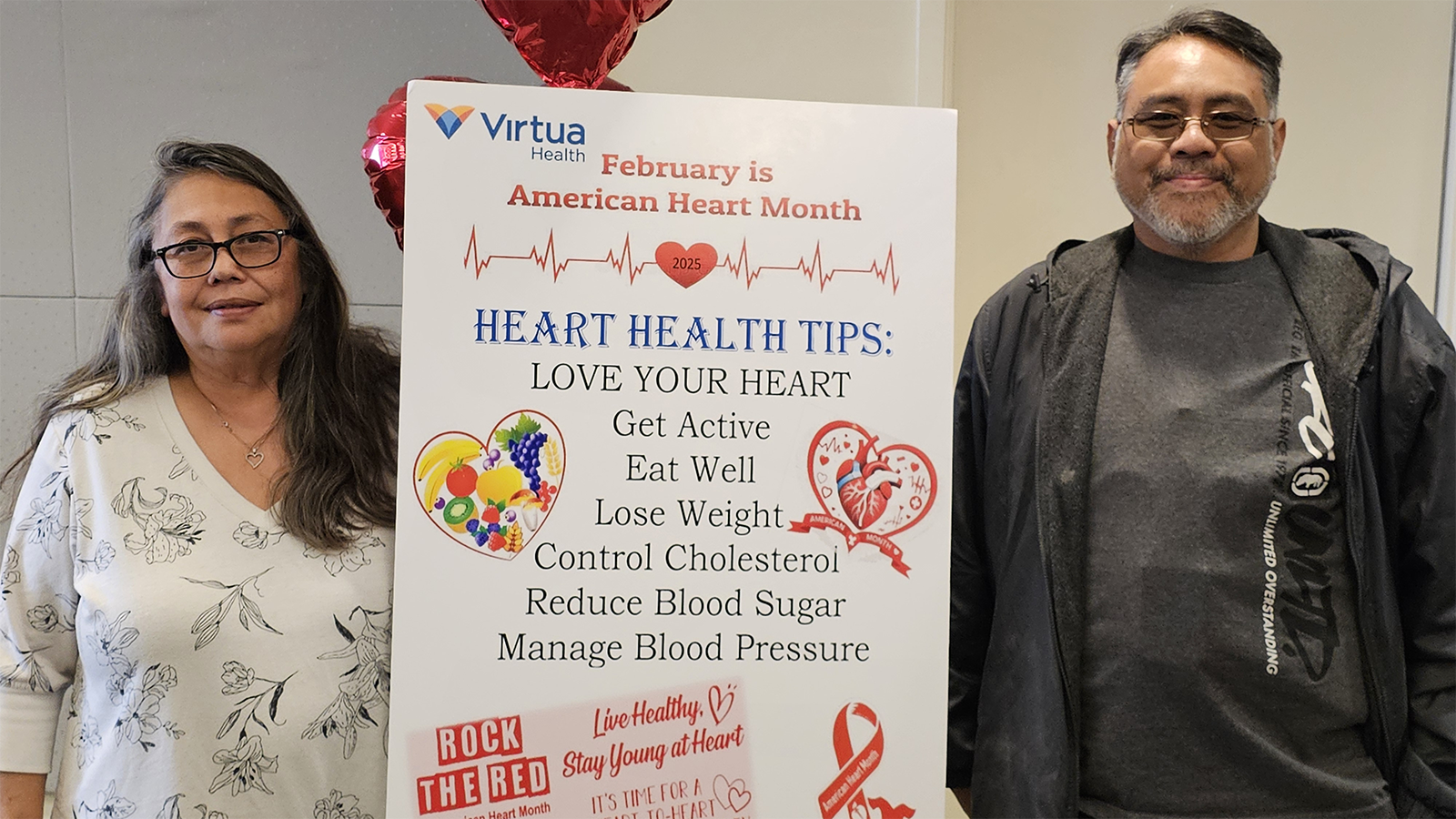Do You Have a Fatty Heart?
There’s usually no hiding from fat. But a type of fat we can’t see can harm our heart health. Virtua cardiologist Thomas Galski, DO, has steps you can take to keep going strong.
By Thomas Galski, DO, FACC, Cardiologist – Virtua Cardiology
There’s usually no hiding from fat. We see it every time we look in the mirror or try to zipper a favorite pair of jeans.
But there’s a type of fat that we can’t see that poses a risk to our heart health. Pericardial fat—fat stored around the heart and in the upper chest—is linked to a greater chance of developing heart failure, atrial fibrillation, and plaque buildup in the coronary arteries that can lead to a heart attack.
The Fat Within
Pericardial fat, sometimes called “fatty heart,” is a type of visceral fat. Visceral fat wraps around your abdominal organs deep inside your body and produce proteins that cause harmful inflammation.
The best way to tell where and how much visceral fat you have is with an imaging test, such as a CT scan or MRI. However, you may have visceral fat if you have a:
- Waist size greater than 35 inches for women or 40 inches for men
- Body mass index (BMI) of 30 or higher
- Body shape like an apple—a big trunk and slimmer legs
Carrying too much visceral fat raises your risk for developing heart disease, type 2 diabetes, stroke, breast cancer, colorectal cancer and Alzheimer’s disease.
No Protection for Being Thin
High amounts of pericardial fat can increase your risk for heart failure and other conditions, regardless of your body weight.
A study recently published in the Journal of the American College of Cardiology found that 10% of people with a BMI of less than 25 still had a high amount of pericardial fat. That number jumped to 29% for people with a BMI of 25 to 30, and 55% for people with a BMI of 30 or greater.
The researchers found that while women usually have less pericardial fat than men, those who had high amounts had double the risk of developing heart failure. Men with fatty hearts had a 53% greater risk for heart failure.
The connection held true when adjusted for other well-known risk factors for heart failure, including age, tobacco use, alcohol consumption, sedentary lifestyle, hypertension, high cholesterol, and previous heart attack.
How Hidden Fat Harms Your Heart
Heart failure occurs when your heart weakens and cannot pump enough oxygen-rich blood to support the body’s needs.
This weakening often is the result of damage to the heart from a heart attack, coronary artery disease, chronic high blood pressure, abnormal heart rhythms, faulty heart valves, cardiomyopathy (an enlarged heart), or myocarditis (inflammation of the heart, usually caused by a virus).
Pericardial fat, however, has a different influence. Pericardial fat can accumulate within the cells of the heart, interfering with its ability to pump blood effectively. Over time, this can lead to heart failure.
Pericardial fat poses another threat to your heart health. Like abdominal visceral fat, pericardial fat is metabolically active, releasing inflammatory substances that speed up the development of plaque in your coronary arteries, called atherosclerosis. Too much plaque clogging your arteries heightens your risk for a heart attack, and subsequently heart failure.
The same inflammation that affects the arteries also may scar the heart and cause atrial fibrillation, a type of irregular heartbeat that increases your risk for blood clots and stroke.
Improve Your Heart Health
To reduce the amount of pericardial fat you may have, work on habits that improve your heart health overall. Try to:
- Exercise. Aim for at least 30 minutes of moderate aerobic exercise each day. Be sure to include strength training to build your muscles.
- Eat a Mediterranean-style diet rich in fresh fruits and vegetables, whole grains, low-fat dairy, lean proteins, legumes, olive oil, nuts, and seeds. Avoid foods high in trans fats, added sugars, and sodium.
- Drink alcohol in moderation.
- Work with your doctor to lower your blood pressure, cholesterol, and blood sugar.
Heart Care in Your Neighborhood
Virtua’s team of more than 100 cardiac experts provides comprehensive cardiac care, from medical cardiology to interventional procedures to advanced cardiac surgery. Appointments are available within 48 hours. Call 888-847-8823.
There's So Much More to Explore
Discover expert insights, inspiring stories, health tips, and more by exploring the content below!

How the Unique Stages of a Woman's Heart Affect Her Health

Complex Aortic Surgery Provides Lu’Shell Hope for the Future

HeartTalk Magazine

Are You Eating Too Much Salt? High-Sodium Foods to Watch For

4 Exercise Tips to Help You Reverse High Blood Pressure

Timely Heart Care During a Heart Attack Helps Joe Feed the Community

3 Reasons Why Now's the Time to Find Relief From Varicose Veins

Lifesaving Heart Care Creates a 'Bond That's Never Left Us'

How High Blood Pressure Affects Your Body

5 Interesting Facts About Your Heart

Get to the Bottom of Blood Pressure Numbers

CABG Surgery: What Women Should Know About Heart Health and Healing

When to Take Action for a Stronger Heart

Groundbreaking Renal Denervation Procedure Controls a Lifetime of High Blood Pressure

Patient Story: LVAD Mechanical Pump Strengthens Michael's Heart Function

Mitral Valve Surgery Keeps Yaneth Living the American Dream
Inside Look at Blood Vessels Aids PAD Treatment
Denise Davis: Pay Attention to Your Heart Health

Sweet Music: Trust, Teamwork Save Justin from Heart Attack

Complex Heart Surgery Nets James a Lifelong Friend

8 Key Steps to Better Blood Pressure Control

Signs You Should Get Treated For Vein Problems

One New Heart Valve Saves Two Lives in the Tritten Family

What You Need to Know About Heart Failure

6 Numbers Key to Keeping Your Heart Healthy

Five Mindfulness Tips That Can Help Heal Your Heart

Watchman Heart Device: a Technological Breakthrough for Blood Clot Prevention

Albert's Emergency Cardiac Surgery Is a 'Story of a Lifetime'

Love Your Heart: Essential Care Tips for Every Stage of Life

How Do I Measure My Blood Pressure at Home?

How Do I Improve My Cholesterol Levels?

3 Ways to Reduce Your Stroke Risk

Can Your Gut Health Affect Your Heart?
Advanced Heart Failure Therapies Get Bernadine Back to Full Speed

Keeping the Beat: Advanced Heart Surgery for Aortic Aneurysm

Heart-Healthy Summer Recipe: Hummus and Veggies

4 Delicious Heart-Healthy Recipes Perfect for Summer

Heart Healthy Summer Recipe: Dessert Parfait

Heart-Healthy Summer Recipe: Pear and Walnut Salad

Heart-Healthy Summer Recipe: Terrific Turkey Burgers
Atrial Fibrillation and Stroke: What's the Connection?
Heart Tests Your Doctor May Order
Managing Pregnancy for Mothers With Heart Conditions

Heart Healthy Recipe: Basil Pesto Pasta With Seared Vegetables

Heart Healthy Recipe Chocolate Avocado Chia Pudding
Keep Your Heart Rhythm in Check With Your Smartwatch
Mind Your Meds for Blood Pressure Risks
Magic Pill for Heart Health? Cut 300 Calories a Day
3 Smart Ways to Boost Your Heart Health
3 Best Exercises For Heart Health

Get Your Heart Pumping With These 25 Workout Songs
Your Chest Pain: Heartburn, Heart Attack, or Something Else?
3 Heart Healthy Recipes to Win Valentines Day
How Work and Home Stress Can Affect You
Why Improving Your Health Is Going To The Dogs And Cats
Why Younger Women Need Start NOW To Safeguard Their Hearts From Heart Attacks
Can You Die of a Broken Heart?
Mitral Valve Surgery Opens Doors for Improved Quality of Life
6 Healthy Habits to Start in Your 20s for Better Lifelong Health
Do You Have a Fatty Heart?
Get Pumped! Assist Devices Can Improve Heart Failure Symptoms
A Cardiologists Advice on Heart-saving Emergency Cardiac Care
Virtua Doctor’s Experience Is a Warning for All About COVID-19 and Strokes
You May Feel Fine, but Gregory Says "Don't Skip Your Medical Care"
In Sickness and in Health: Couples Often Share Heart Disease Risk
"Reduce Your Heart Disease Risk With a Plant-based Diet"
Hybrid Robotic Heart Surgery and Valve Replacement Restores Quality of Life
Can Marijuana Hurt Your Heart Health?
6 Tips for Restoring Your Heart Rhythm
Eat Smart for Your Heart
Cardiac Rehab: Strengthening Your Heart After Leaving the Hospital
Your Heart Needs A Good Nights Sleep
Are You at Risk for AAA—the Silent Killer?
The Cardio Oncology Team Protects Your Heart During Cancer Treatment
Get Relief From Painful Varicose Veins This Summer
Exercise Your Way to a Stronger Heart
Fish Oil: A Good Catch or a Scam?
My Heart Seems to Skip a Beat - Should I Be Worried?
Menu Planning? Try These 5 Heart-smart Substitutions

5 Health Risks Tied to Weight

